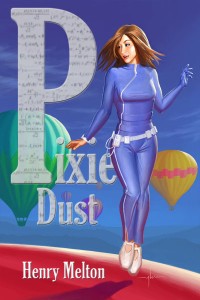As I sit at my table, talking to people looking at my books, people often ask about the artists. “Who did that cover?” In this and a few other interviews, I’m hoping to answer that question.

Arthur Wang showed up in an email one day and I’ve never met him in person, but he did a great job on Pixie Dust for me.
Heya Henry! Sorry for the long wait, I just moved to school to finish up my degree and things have been pretty hectic. Answers to your questions below!
Introduce yourself. What kind of work is your specialty? How long have you been at it?
I’m Arthur and I’m actually half illustrator, half designer. Illustration is really more of a side-job for me, since as much as I like it, work isn’t as stable as I’d prefer, so I’m actually studying to be a product/industrial designer. With regards to paintings, half of what I do is scifi/fantasy and the other half is a bit of a gloomier, more somber “surreal figurative”, which I usually do with oil paints.
How did you meet up with Henry Melton and why did you decide to help him with his art needs?
We met through the internet! What a modern wonder it is. 😀 I remember hearing the idea for the story and thinking “hey, this could be fun!” I hadn’t really done much young-adult/lighthearted work up until that point, and it was a very fresh change from robots, sorcery, and explosions. I think this was also one of my earliest commissioned/published pieces, and I’m glad I got a start with Henry.

Many artists collaborate with others to produce the final image. Did you create the cover art yourself, or with the help of others? If this was a collaboration, then who did you work with?
Every piece I’ve done has been, I suppose, a solo piece. If you wanted to stretch the definition of collaboration, then obviously the input of the writer that creates the story is of paramount importance, but all the artwork is done myself.
Were there any notable difficulties, or high points in creating the image?
I like painting because it gives the artist the chance to exaggerate certain things, and I remember being fascinated by the way light works on the human body. Specifically, when you see a thin layer of hair (as in the cover!) with light filtering through it, or the how the exact spot on skin where a shadow meets light is always so bright and colorful. I love those little nuances.
What is the hardest part of doing cover art for novels?
Having the artist’s and the writer’s ideas match up! This is an innate challenge when dealing with more than one human being at a time, and it’s still true in this partnership. We have to learn to communicate to each other what we’re looking for, but at the same time complement each other with our individual strengths. Can I, as the artist interpreting the work, elevate the script that I hear through my own skillset? I think it’s my grand goal to make the cover something that adds to the story.
Do you prefer to work from a single concept? Or would you rather read the text and create an appropriate image?
I like having a piece that isn’t necessarily a literal translation of what’s happening in the book. If you look at old Star Wars posters, for instance, you get a good feel of what characters, environments, and feeling is in the movie, but not necessarily a step-by-step of the plot. I think this is a good approach, and allows us to really get flexibility in portraying what we feel are important things for the reader/viewer to know about the story. I’m always a fan of a bit of abstraction and minimalism in my work.
Where is your artwork leading you? Do you intend to do more cover art, or have you passed that by and are heading for other goals?
So far, illustration is really a fun side gig for me. I’ll sometimes get approached by writers who’ve seen my work somewhere, or when I’m feeling a little uninspired, do some searching on my own for a fun project to work on. I like the nature of this interaction more, as I can really fully enjoy the process when it’s not the difference between life-and-death. If I don’t like the sound of a project, I can simply turn it down. With illustration not being my main bread-winner I get to be a bit more picky about who I work with and what projects are really fun.
Where can the reader see more of your work? Do you have a website? Are there other notable works they can find?
My site is at ArthurWangArt.com, and is split into a “design” section and a “fine art section.” Feel free to take a look, and thanks for reading!
Arthur Wang
Illustrator / Designer
646.934.7188
—
And thanks for your time, answering these questions.